I gotta say, I was a little bit worried last week with how Twelve Kingdoms handled a few things. Sugimoto seemed like wasted potential, still might be to be frank, and the pacing was whack. But Twelve Kingdoms isn’t letting that hold it back as it barrels forward into 3 more good episodes! This week we hear the King of En’s backstory, get a lot more information on King/Kirin relations and finally meet Kou face to face. So lets jump right in!
This week on my little pre-spoiler production section I want to take a moment to talk about the OST. While watching, Twelve Kingdoms sounded… fine, but not unique. Like basic background music. However when I went and listened to the full tracks on Youtube, boy was I surprised. Rather than a bunch of smaller one-note pieces, I found a smaller selection of pieces that shifted between these different melodies, each in their own style. Take the piece “Kuni-Touhoureiin“. It starts primarily as a flute piece, really evoking that Mulan, Eastern China vibe, before it shifts into this rolling drum beat before shifting again to let the strings take control. Another piece, “Ifuuoukei” does this as well with low flutes into strings and drums. Or “Getsumeifuuei” with soft vocals. It’s a small sample size for now, but I’m going to keep an ear out for how its used in the future.
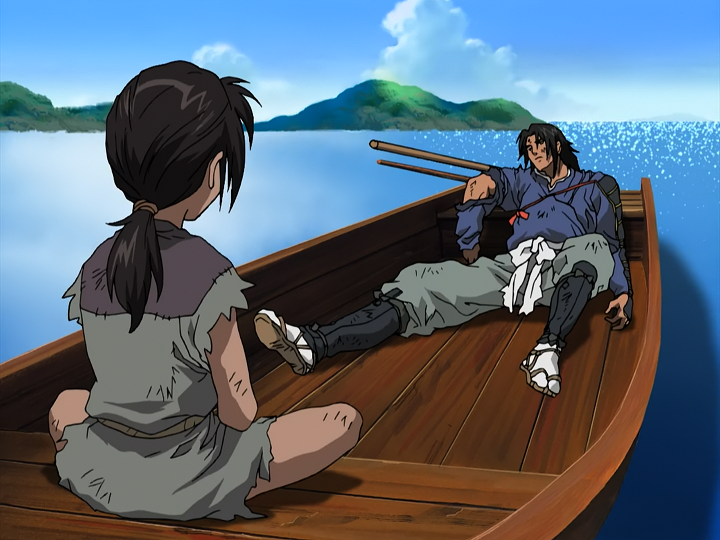
Getting into the actual episodes, this week was all about kings. Kings, Kirin, the heavens, people and the relationship between all four. To put it simply, it was a shit ton of world building, and I loved it. Twelve Kingdoms did a pretty good job of wrapping all of this information up in an easily digestible character story. All the while establishing the who exactly the King of En, Shoryu, is. Ordinarily I wouldn’t call this sort of thing out. Good exposition is generally pretty obvious. But Twelve Kingdoms is really rocky on this front. For every well structured story like this we get like 10 made up words. Kirin, Taika, Hanjyuu, Taishi etc. These wouldn’t be so bad if Twelve Kingdoms didn’t expect me to remember them all. That said, for all the annoying words, when combined with this kind of backstory it makes this world feel… whole.
What do I mean by whole? I mean that it feels like there is thought put behind every part of it. That every aspects flows into another, that thought was put into how they effected each other. Take the Taika, for instance. Early on we learn that people from our world can be pulled into this one. So it makes sense that it could go in the opposite direction. Further building on that, we have the Ranka fruit trees, with each kind of tree birthing different creatures, from Kirin to Kings. It feels like the author of Twelve Kingdoms, Fuyumi Ono, considered how each of these would effect each other. She didn’t exclude any of them from the rules of the world just because it was inconvenient for the story. Rather she brought them in, building on Taika, knowledge exchange between worlds etc, to expand the stories scope.
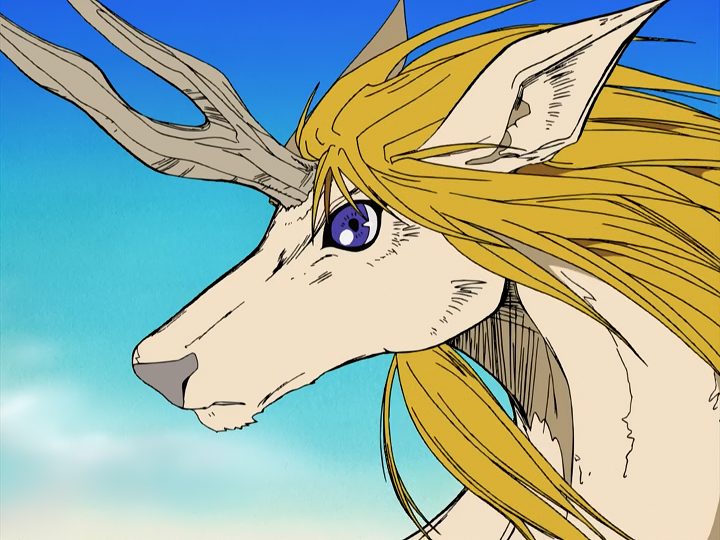
We see this in Shoryu and Enki’s backstory in episode 10. On a meta level this serves to educate us on how Rulers and Kirin are chosen. How their rules work, their limitations, their relationship etc. How anyone can be chosen to be a King, there is no hereditary heir or anything. For instance, Twelve Kingdoms had already mentioned in passing how a kingdoms health is effected by a rulers age/actions. Similarly for Kirin, we already knew about the Shitsudou. But it’s here that we learn just how tightly they are bound. That a Kirin can outlive a ruler but a ruler cannot outlive a Kirin, how they are bound. Before this it was a much more nebulous idea. One enforced by the will of Heaven. Here it still technically is, but it feels a lot more rigid, with clearer examples to go along with it.
Meanwhile on the personal level this episode serves to teach us about Shoryu and Enki. Fun fact by the way, I just noticed all the Kirin have their Kingdoms in their name, Kou-rin, Kei-ki, En-ki, etc. Back to the episode, Twelve Kingdoms did a great job here showing just how different the two are. How both are Taika, raised in our world, yet they have two completely different world views. One hates Kings and all that come from them, because he was born into a time of war between clans. Meanwhile the other wishes to rule to provide for his people, but isn’t as perfect as one would expect. He still lusts after a kingdom, still has that ambition, wants to rule. It may be for good reasons with good intentions, but he isn’t the paragon of virtue one might expect.
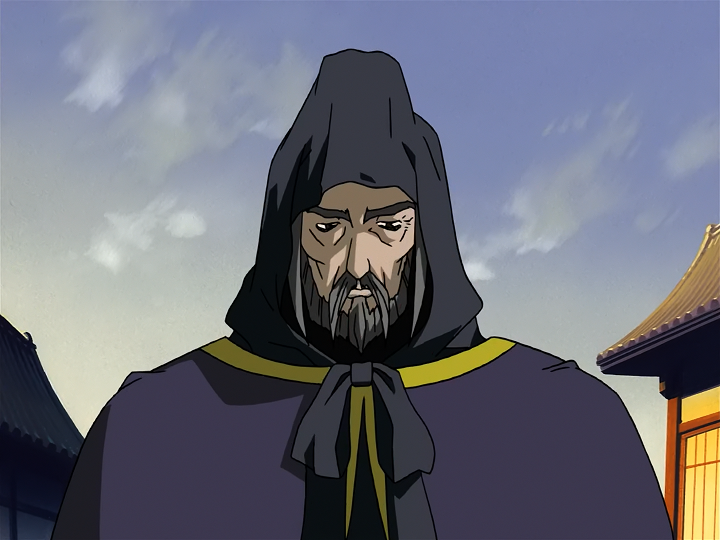
Meanwhile from a different King we see the complete opposite, one fueled by envy and spite. I have to say, he was a lot more… fatalistic than I was expecting. I figured he had some grand scheme to break the rules and conquer another country. To expand beyond his kingdom and take over… well all 12. To hear it was actually one big ball of spite? That he knows he isn’t going to last long, and just wants to take another kingdom down with him? It’s… suitably petty. It fits him, it fits his actions, and it fits the rules of Twelve Kingdoms. He knows he can’t rule Kei, and he has two very prosperous kingdoms on either side. For Kei to become prosperous as well, lead by a Taika like En, would just solidify his incompetence. But the best part for me was what this revelation did for Sugimoto.
Up until now I have been a bit harsh on Sugimoto, or rather how Twelve Kingdoms uses her. I thought they could have done more, used her in a longer running narrative with the Kou King. Whether it be as a fake Queen of Kei, or rebellion or who knows what, the point being she could have been more. I still sort of feel that way, that Sugimoto could have been more. That we could have either expanded or removed a lot of her content without really missing anything. Even this most recent revelation of hers feels like its retreading a lot of the same ground, just with a more final tone to it all. The same could be said for Nakajima and her self-confidence issues. However good these arcs are, and I have enjoyed them, we’ve seen them before in this same series.
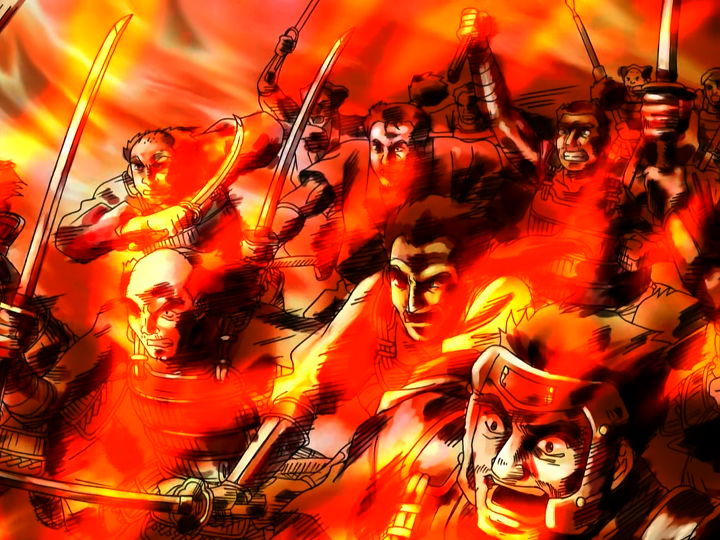
That said, this revelation of how small the Kou King’s plans are has woken me up a bit. I assumed he would be a consistent villain throughout the story, with the end being when Nakajima successfully takes the throne. I see now however that this is simply the first arc and that the story no doubt continues past her coronation. While it might hurt this opening bit slightly, it makes me excited for what is to come. Will we get to meet the other kingdoms? See how she rules, how she overcomes challenges, learns about this world and becomes a true ruler? Maybe even a little bit of rebellion or some kind of war? I don’t know, but we have 30+ more episodes with which to cover it all. I can only hope that Twelve Kingdoms lives up to my expectations here.
With that we can get into the quick thoughts on each individual episode, starting with episode 10. This one confirmed a lot of things I had thought up until now. The sword, named Suiguu, was in fact showing true visions. There are a lot of minor details about its name, how it was forged, etc. But the big one is that her ability to wield it is further proof of her role as the Queen of Kei, as only they can wield it. Beyond that we also got more information on Kings, Kirin, etc and a final answer on whether or not Nakajima can go home. The answer of course being, yes, she can. But to do so is to doom Kei and herself, so really its a light “no” more than anything. That said, for all the exposition and explaining, I really liked the world building this episode.

Not world building in the narrative sense, though Twelve Kingdoms gave us that to. Rather I loved the scenery of this episode, the backgrounds, literal heavenly mountain. Everything about it was so fantastical yet so well realized that Twelve Kingdoms finally felt like a fantasy world rather than the medieval age with youma. The magical staircase was a small, but cute touch. The huge mountain with a palace sitting atop it, surrounded by a sea of clouds. Only once you go above said clouds it becomes a literal ocean of water, the lights of the towns beneath it reflecting up through the surface. It legitimately felt like an otherworldly palace, like heaven on earth, and went a long way towards establishing just how important rulers are in Twelve Kingdoms.
Moving on to episode 11, the backstory episode. I mentioned earlier that I really liked this episode, and thats primarily due to Enki. Because while this is Shoryu’s origin story, it’s more Enki’s story than his. We see his life in Japan, his father leaving him for dead and his quiet acceptance, and how all of that influenced him in the other world. How this influenced his disdain for Rulers, so much so that he was even willing to let the kingdom die before choosing one. I mentioned this earlier as well, but I think Twelve Kingdoms did a good job setting these two characters towards the same goal with opposing motives. Enki doesn’t want a King, but clearly cares for the people and so will do his best to keep Shoryu in line. Meanwhile Shoryu is just happy to rule, taking care of the people as he does.

Finally we come to episode 12, the big “finale” of this opening arc, if we can call it that. While I wasn’t a fan of how much these character beats retread prior ones, overall I liked it. For all the minor issues, Twelve Kingdoms has still established an interesting world, interesting plot and interesting characters. Just because they aren’t used to their fullest extent doesn’t stop them from still being good and we see that here. Because for all that the final fight is awkwardly animated, or that Sugimoto’s still an idiot, I was invested enough to care. I enjoyed her questioning the Kou King, how Suiguu once reflected Nakajima’s insecurities and now does the same to Sugimoto, and her realization that this isn’t her world either. The only thing left to do is see how Twelve Kingdom’s handles this new Sugimoto. And if she backslides again? Then I’ll bitch.
So all in all, how were these episodes of Twelve Kingdoms? Like I said, for all that it could be more, I still enjoyed it. I’m still able to enjoy watching 3 episodes back to back every week, looking forward to more. I can’t do that with most seasonals and they only air one episode a week. So for Twelve Kingdoms to make me finish 3 episodes and have to stop myself from watching more just to write this post? Well, for all my complaining, it’s clearly doing something right. What about what you, what do you think of Twelve Kingdoms? I miss any glaring issues or subtle plot points? I know I gloss over things at times, and that’s because I don’t want to inundate you with words. This post is already at 2000! So if there is anything, let me know below. I love responding to comments!

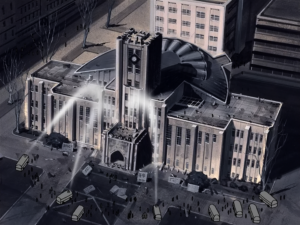
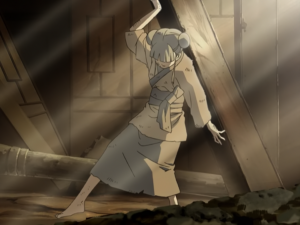

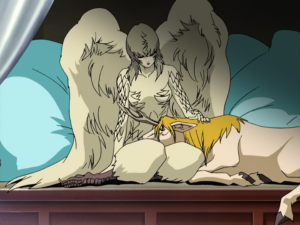
Since you finished the first arc, I wanted to comment. I love this show, it’s been a long-time favorite of mine. I’ve also read some of the books. The first arc is a “mostly” faithful adaptation of the first novel, but, the characters Sugimoto and Asano were invented for the anime adaptation and are absent from the novel. I think that it was the right choice, because it would be a bit more boring if they were just dealing with Youko alone (basically wandering around in the woods for a good part of the story), it makes sense that there is a bit of waffling with regards to their place in the story.
The second arc is a faithful adaptation of the second novel and I do not believe that they added any fluff characters for that one!
Glad to see someone digging in after all of this time and appreciating it. There are still great things ahead.
(I thought that the novel line was done some time ago, and was a bit sad about that, but I just now checked and realized that a new story was put out in late 2019… Gotta check it out if there is a translation available.)
Woah, Sugimoto and Asano are anime only characters?! That… explains a lot. They weren’t allowed to do anything permanent and it explains why Sugimoto’s arc with Nakajima feels so half-assed. Sugimoto wasn’t actually allowed to effects Nakajima’s arc, because she didn’t exist in the original arc to begin with!
Its a shame, because I agree. I think the anime would be worse if they didn’t exist because they give us things to do when Nakajima is figuring her shit out. They gave us places/views to cut to when she wasn’t able to be active. It’s a shame, because I really think they could have been so much more had they been allowed to actually effect the story.
Sounds like the 2nd arc is going to be a good time though! I really like the setting and well realized it is. I’m looking forward to Nakajima continuing to grow into her role as a Queen and how her relationships with the other rulers will come into play. I’m very curious for instance if she will stay friends with Shoryu or if they will end up disagreeing on how to run their countries, etc.
Knowing that the books are different, I might have to find them and give them a read once i’m done. Thanks for letting me know!
The first arc still has one episode to wrap things up. The conquest of Kei by Nakajima is largely skipped over, but it is a succinct resolution to the arc.
Two characters that always struck my interest in these episodes when I first saw Twelve Kingdoms were the two kaikyaku (Japanese transplants into the Twelve Kingdoms), Rakujin and Shoryu. At the time I knew more about the real-life history of the former, and less of the latter.
For the latter: Shoryu purports to be from a sea-faring Japanese culture.
In researching this, I became familiar with Japan’s sea-faring feudal history. They were raiders, most often described as pirates by the Mainland Orientals as well as other Japanese, with limited navigation in blue waters; they were essentially coastal seafarers. Their plunder ranged from valuables to slaves, and their exploits have been recorded by even European wayfarers, such as Francesco Carletti in “My Voyage Around the World”.
For the former: Rakujin is a “Young Communist Revolutionary” who comes from an interesting time in 1969 during the post-WW2 era. Japan, at the height of the Cold War, was still coming to grips with the aftermath of the Japanese Empire’s dissolution when the Imperial Japanese Army and Administrators throughout East Asia sorted themselves out, dislocated by the American-Soviet divide. Many Japanese continued the “Asia Co-Prosperity Sphere” on the Asian Mainland in an attempt to revitalize Pan-Asianism that would subsume (and necessarily destroy) the distinct histories and ethnicities of East Asia, from the Manchus to the Wu to the Tibetans.
These Japanese Military and Elites and a huge Japanese “expat” community (the Japanese Empire had a population of about 300 million in 1941 – twice that of the United States – the result of a Meiji-era imperial-enacted breeding campaign) had already built lives and relationships in the Oriental Mainland (now “China”) and especially Manchukuo. With Japan’s defeat, they made common cause with the Soviet and Chinese Communists and the Chinese Red Army against the Nationalists, and renamed the original Japanese-led Asia Co-Prosperity project into the Chinese-led “People’s Republic of China”. These successful Japanese revolutionaries then exported their new version of the Pan Asian Co-Prosperity Sphere to other parts of the world, including Japan (now under American domination, which was the cause of cognitive dissonance for many Japanese Imperialists from the Mainland).
Rakujin is purported to be one of the disciples of this new Pan Asian Communist Revolution which stretched from the PRC to North Korea to North Vietnam to the Middle East, etc.
But the Japanese Reds were simply a re-branding of the old Japanese Imperial Pan-Asianism that was rejected by Sun Yat Sen, fought against by Chiang Kai Shek, and was ultimately defeated by the US. The nail in the coffin came as Douglas MacArthur famously desecrated the “Yamato” race’s religion and Shinto “god”, disproving the “Flying Geese formation” – or at least creating an undeniable reality that was unpalatable to the ideology of Yamato supremacy (“Yamato-Damashaii” became a heresy among non-Japanese Asians).
Rakujin and his Communist Revolutionaries ultimately failed. The PRC switched sides in the Cold War starting in 1969 away from Mao’s Communist vision, leading to its incorporation in the American “First World Economy” and away from the Soviet Union’s “Second World Economy” (a mind-boggling re-arrangement of worldwide resources and supply lines) Although South Vietnam and much of Indochina would fall in the game of musical chairs during the re-shuffle, China was added to an uneasy alliance and “Peace” with Taiwan, South Korea, Japan, Singapore, etc.